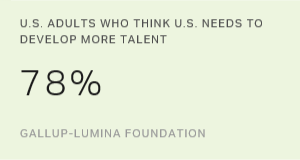Story Highlights
- Employers think college grads aren't developing workplace skills
- Inherent talents for enterprise are essential
- Assessment uncovers inherent entrepreneurial mindset
The global war for talent is heating up as human capital is becoming a competitive advantage for companies fighting to stay profitable.
As corporate profit growth slows, new competitors are upending industries and challenging accepted business models. Companies are looking for intellectual talent that can meet the challenges of this quickly evolving business landscape.
Unfortunately, employers believe that college graduates aren't developing the skills needed for the 21st-century workplace. And nearly eight in 10 (78%) U.S. adults agree, "If the U.S. fails to develop a more talented workforce, it will fall behind other countries," according to a Gallup-Lumina Foundation poll.
A recent survey of millennials by Deloitte indicates that students are also questioning how much their employers value their academic education. Deloitte found that the skills students gained in school -- time management, academic knowledge, teamwork and analytical skills -- were different from those that employers valued -- leadership, sales talent, general business knowledge and being entrepreneurial.
A report produced by Oxford Economics lists the qualities employers need most in future employees. Interestingly, skills one can learn through education and training -- such as statistical analysis, profit and loss management, and programming languages -- didn't make it to the top of the list. Instead, employers are looking for particularly human qualities in future hires: Relationship building, dealing with complexity and ambiguity, balancing opposing views, teaming and collaboration, co-creativity, cultural sensitivity, and the ability to manage diverse employees emerged as top priorities of hiring managers.
What matters most isn't who can write the best code, is proficient in managing profit and loss responsibilities, or can create the best blog in WordPress. Instead, what's crucial is the inherent enterprising qualities a person possesses.
Critically Important to Identify Enterprising Qualities
To find workers who will move a business forward, companies must identify each person's inherent talent -- especially the enterprising qualities required in the workplace of the future. Developing these abilities is almost impossible for those who don't have them innately. For example, a talented salesperson inherently knows when and how to close a deal. A person with strong interpersonal talent instinctively creates emotional bonds with customers, can build trust and loyalty with employees, or innately knows how to use her networks to access information critical to her business' survival. A risk-taker knows how to take advantage of market gaps.
Learning these intrinsically human qualities is not like learning to write code or understanding how to operate a machine. How do you teach someone who lacks the right talents to gauge when to close a business deal, respond appropriately to an irate customer or recognize opportunities? Training and practice in areas of non-talents, though helpful, will only lead to average performance at best. It's much more productive to spend time honing the talents one has.
Cultivating an Enterprising Mindset
Through 40 years of research in the field of talent and strengths development, Gallup has developed a structured Web-based assessment called Builder Profile 10 (BP10) along with a program designed to cultivate an enterprising mindset among college students. Participants begin the program by identifying their entrepreneurial talents through the BP10. Each participant receives a customized report that measures and ranks 10 talents that successful entrepreneurs share: Confidence, Delegator, Determination, Disruptor, Independence, Knowledge, Profitability, Selling, Relationship and Risk. Participants then go through a program that helps them develop and direct their entrepreneurial talents.
The program's objective is to identify and build an entrepreneurial mindset among college students, supporting them in developing the qualities -- such as resourcefulness, teamwork, creativity, relationship building and resilience -- employers are looking for in the workforce of the future.
Gallup conducted a quasi-experimental study across several schools in the U.S. to test the effects of this entrepreneurship program. Gallup assigned participants in the program to two groups. The intervention or study group took the BP10 and then attended Gallup's entrepreneurship program. The no intervention or control group did not take the BP10 or attend Gallup's program. Gallup assessed all students from the study and control groups on four outcomes before the intervention (pre-test) and following the intervention (post-test). The four outcome measures are self-awareness about what students are like (their entrepreneurial talents), self-efficacy in their ability to start and manage a business, hope for the future and intent to start a business. Results from the pilot study showed several positive effects:
- There was a significant treatment effect. In other words, students in the study group who participated in the entrepreneurship program consistently scored better on all the outcome measures compared with students in the control group who did not participate in the program. Students in the study group who went through the program showed increased levels of self-awareness about their entrepreneurial talents, increased levels of confidence in their ability to start and manage a business, high levels of hope for their future and higher intent to start a business.
- Though all the students in the study group showed gains on the performance metrics (self-awareness, self-efficacy, hope and intent to start a business), those with higher levels of entrepreneurial talent gained more from the experience of participating in Gallup's program. This finding is consistent with talent theory, which states that underlying talent levels enhance scientific training and performance. Gallup defines talent as the natural capacity for excellence in a role. Talent facilitates deep engagement in a task and accelerates learning. Students with higher levels of basic talent for entrepreneurship are likely to achieve mastery in the role faster than those with lesser talent for the role.
The experience of identifying one's innate talents as well as receiving a customized report and structured feedback from a coach or an instructor primes entrepreneurial behaviors. This "priming phenomenon" -- or the influencing of actions by ideas -- can help participants develop and direct their enterprising qualities.
About 16 million young adults enter college every year, but according to a survey conducted in 2014 by AfterCollege, more than 80% of college seniors graduate without a job. Another survey of 2014 college graduates by CareerBuilder found that only 36% of graduates are employed in full-time, permanent positions. One-third are in part-time or temporary positions or doing internships; the rest (31%) are not working.
These findings indicate that many new entrants in the workforce are unemployed or forced to accept part-time jobs that pay less and do not make full use of their talents and potential. Educators can make a difference in these students' lives by inculcating self-awareness about who they are, the innate talents they possess and what they like to do. This knowledge will enable them to find careers that fully use their talents and engage them, leading to more fulfilled lives as well as the ability to meet the demands of a tough business landscape. Identifying and developing college students' entrepreneurial talent might be the first step in helping them be more prepared for the workforce.


